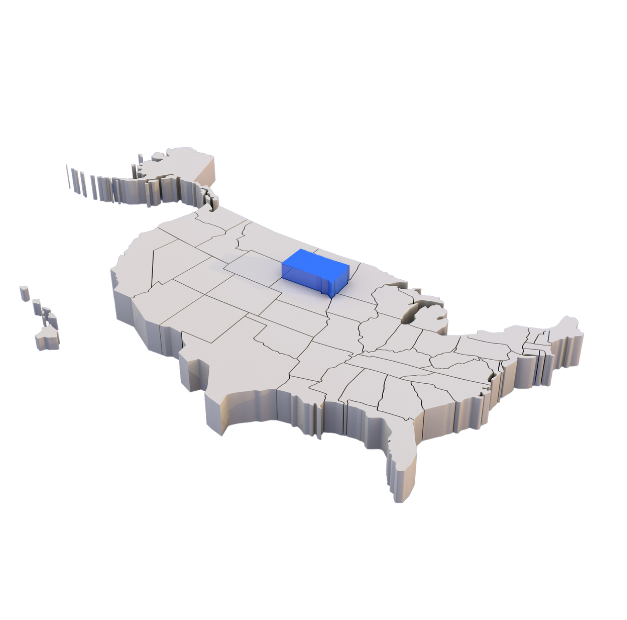South Dakota Medical Cannabis Laws
South Dakota’s medical cannabis program, established after the passage of Measure 26 in November 2020, allows qualified patients to legally purchase and consume cannabis for medical purposes. The program, which began on July 1, 2021, sets strict regulations, including a purchase limit of 3 ounces of cannabis flower every 14 days and permits patients to grow up to four plants for personal use.

South Dakota Medical Cannabis Laws at a Glance
- Medical cannabis use was legalized in 1998 via the Alaska Medical Marijuana Initiative (Measure 8).
- Recreational cannabis use was legalized via the passage of Measure 2 in 2014.
- The Alcohol and Marijuana Control Office (AMCO) is the regulatory agency responsible for overseeing the Alaska cannabis industry.
- Alaska’s track-and-trace system is Metrc.
- Cannabis delivery is currently not permitted in Alaska.
- Marijuana stores can sell only 1 ounce, 7 grams of marijuana concentrate for inhalation, or 5,600 milligrams of THC in combined sales.
- Onsite consumption is legal in Alaska, pending approval and all regulations are met.
Next, we’ll delve into the specifics of each law to help you stay compliant with Alaska’s cannabis regulations.
South Dakota Medical Cannabis Licensing Requirements
To operate a medical cannabis dispensary in South Dakota, applicants must meet specific licensing requirements set by the South Dakota Department of Health. Here are the key elements of the licensing process:
- Application Submission: Applicants must submit a detailed application, which includes a nonrefundable $5,000 fee. The application must provide the dispensary’s legal name, physical address, and information on all principal officers and board members. One principal officer must be a resident of South Dakota.
- Operating Procedures: The application must outline standard operating procedures (SOPs) covering security, quality assurance, recall procedures, packaging and labeling, inventory control, and recordkeeping.
- Zoning and Local Compliance: Applicants must include documentation proving compliance with local zoning laws and any required local registrations or permits.
- Age and Background Checks: All employees and principal officers must be over 21 and pass a criminal background check. Anyone with a disqualifying felony conviction is ineligible for employment at a dispensary.
- Approval Process: The Department of Health has up to 90 days to review the application and issue a registration certificate if all conditions are met.
This thorough application process ensures that only qualified, compliant businesses can operate within South Dakota’s medical cannabis framework.
General Requirements for Operating a Medical Cannabis Dispensary in South Dakota
Operating a medical cannabis dispensary in South Dakota involves adhering to specific regulations to ensure compliance with state laws. Here are the general requirements:
- Employee Background Checks and Age Restrictions: Every officer, employee, and volunteer working at the dispensary must undergo and pass a criminal background check. Additionally, all staff members must be at least 21 years old. Those with disqualifying felony convictions cannot be employed by the dispensary.
- Recordkeeping and Oversight Procedures: Dispensaries are required to have detailed operating documents that outline procedures for oversight, accurate recordkeeping, and security measures. These procedures are designed to ensure that the dispensary operates within the legal framework and maintains proper records for all transactions and inventory.
- Security Measures: The dispensary must implement robust security measures to prevent theft of cannabis products and unauthorized access to areas containing cannabis. This includes physical security measures such as lighting, alarms, and secure storage for all cannabis products.
- Inspection Compliance: Medical cannabis establishments are subject to inspections by the South Dakota Department of Health during business hours. These inspections are conducted to ensure that the dispensary complies with all regulatory requirements.
These general requirements are crucial for maintaining the integrity and security of South Dakota’s medical cannabis program.
Restrictions for Medical Cannabis Establishments in South Dakota
Operating a medical cannabis establishment in South Dakota involves adhering to specific restrictions to maintain compliance with state laws. Here are the key restrictions:
- Employment Restrictions: Medical cannabis establishments cannot employ anyone under the age of 21 or anyone who has been convicted of a disqualifying felony offense. This ensures that all staff members are legally qualified to work in a regulated environment.
- Prohibition on Shared Office Space and Referrals: Establishments are not allowed to share office space with a medical practitioner or refer patients to specific medical marijuana doctors. This rule is designed to prevent any potential conflicts of interest and ensure that medical cannabis recommendations remain unbiased.
- Prohibition on On-Site Consumption: Consumption of cannabis is strictly prohibited on the property of a medical cannabis establishment. This rule is in place to ensure that dispensaries maintain a professional environment and to prevent any misuse of cannabis on-site.
These restrictions are critical for maintaining the integrity of South Dakota’s medical cannabis program and ensuring that establishments operate within a legal and ethical framework.
Conditions for Dispensing Cannabis in South Dakota
Dispensaries in South Dakota must follow strict protocols when dispensing medical cannabis to ensure compliance with state regulations:
- Verification of Patient Identification: Before dispensing cannabis, a dispensary agent must verify that the patient’s medical marijuana card is valid. This involves checking the cardholder’s registration against their photo ID, which must be issued by the state, another state, a tribe, or the federal government.
- Adherence to Purchase Limits: Dispensaries are required to monitor the amount of cannabis dispensed to ensure that it does not exceed the legal limit of 3 ounces within a 14-day period. This includes tracking purchases to ensure that no patient or caregiver exceeds their allowable amount.
- Designated Dispensary Verification: Before any cannabis is dispensed, the agent must verify that the dispensary is the designated one for the patient or caregiver in the state’s medical cannabis program. This prevents unauthorized dispensaries from dispensing to patients who are not registered with them.
These conditions are in place to maintain the integrity of the medical cannabis system in South Dakota, ensuring that cannabis is dispensed responsibly and within the legal framework established by the state.
Privacy and Data Requirements for South Dakota Medical Cannabis Establishments
Medical cannabis establishments in South Dakota must adhere to stringent privacy and data protection regulations to ensure the confidentiality of patient information:
- Patient Identification Confidentiality: Dispensaries must maintain patient information with utmost confidentiality. The records should only identify patients by their registry identification number, and should not include any personal information such as names or other identifying details. This helps in safeguarding patient privacy.
- Verification Upon Request: The South Dakota Department of Health can confirm a patient’s status as a registered qualifying patient or designated caregiver to a third party (like landlords, schools, medical professionals, or courts) only upon the request of the patient. This provision ensures that patients have control over who can access their medical cannabis status.
- Destruction of Outdated Media: Any outdated or unused media containing patient information, such as hard drives or other data recording devices, must be securely destroyed. This ensures that no residual data remains accessible, further protecting patient privacy.
These requirements ensure that medical cannabis establishments in South Dakota maintain the highest standards of data security and patient privacy, reflecting the state’s commitment to protecting its medical cannabis users.
South Dakota Medical Cannabis Laws FAQs
- How much cannabis can I purchase in South Dakota? In South Dakota, medical cannabis patients are allowed to purchase up to 3 ounces of cannabis flower or its equivalent in other forms (like concentrates or edibles) every 14 days. This limit also applies to purchases made by the patient’s registered caregiver on behalf of the patient.
- Can I grow marijuana plants in South Dakota? Yes, medical marijuana patients in South Dakota can legally grow up to four cannabis plants for personal medical use. This allows patients to have a consistent supply of cannabis tailored to their medical needs.
- Is marijuana illegal in South Dakota? While recreational marijuana remains illegal, South Dakota legalized medical marijuana on July 1, 2021, following the passage of Measure 26 in November 2020. This allows qualifying patients to use cannabis for medical purposes.
- How is cannabis taxed in South Dakota? Medical cannabis in South Dakota is subject to a 4.5% state sales or use tax. Additionally, local municipalities may impose an extra tax if the purchase occurs within their jurisdiction.
Disclaimer: The material contained on this website and any attached or referenced pages has been compiled by UZIO for informational purposes only. It is not intended to be and is not considered to be legal advice. This post is current as of [13-Aug-2024]. Cannabis regulations are rapidly changing, and legal advice of any nature should be sought from legal counsel.
Need Help with State Cannabis Compliance?
Our experts can help you navigate complex cannabis regulations and ensure your business stays compliant.
Biography
As a CTO, Mak Thigale leads the Products and Engineering at UZIO. He drives UZIO’s charter of being an AI First company. He has a hands-on approach to AI strategy and implementation. He guides the UZIO team to identify impactful AI use cases, experiment with technologies like machine learning, LLMs and agentic frameworks, and to put AI solutions in production.
Mak is an accomplished technology leader with over 35 years of global IT experience, bringing deep expertise in AI, technology transformation, and large-scale enterprise solutions. He has successfully led multi-million and billion-dollar outsourcing engagements across industries, including Healthcare, Manufacturing, Technology, BFSI, and Utilities, for Fortune 500 companies.
Mak’s professional journey includes leadership roles at Wipro, where he spearheaded initiatives in hyper-automation, delivery transition & transformation, and M&A integration. He has also advised companies on leveraging Generative AI (Gen AI) and large language models (LLMs) to deliver greater value to stakeholders. Mak is a global citizen having lived and worked in the US, Canada, Germany and India and has managed large, global teams.
Mak’s other passions include cooking, reading, and traveling. He is an avid follower of cricket.
Mak holds a Bachelor of Engineering in Computer Science from Pune Institute of Computer Technology, Pune, India.
Biography
Lilly Raney, the newly appointed Head of Sales for UZIO, brings over 15 years of diversified industry experience to her new leadership role. Beginning her professional journey in the athletic footwear and apparel sector, she spent a decade supporting specialty brick-and-mortar establishments. In 2018, Lilly made a strategic transition into the cannabis field.
She has since devoted 5 years to specializing in SaaS POS systems, first within the cannabis industry, and subsequently expanding into other SaaS verticals including HR/Payroll with UZIO. As a former Regional Sales Director at Dutchie, Lilly’s core expertise centers on sales leadership and operational efficiency.
With a proven track record and a steadfast dedication to pushing boundaries, Lilly Raney emerges as a beacon of excellence within the realm of sales leadership. Her unwavering dedication to fostering a strong and sustainable future for the cannabis industry is a testament to her commitment to innovation and growth.
Biography
Peter Harrison has over 35 years of experience building and leading global technology companies. Started and grew five companies, two that went public and three that each went on to be worth over $1 billion.
Directly involved in raising $600 million of private and public capital and led the acquisition and integration of a dozen firms, creating businesses with a combined market capitalization of over $18 billion.
Biography
Human Resource Professional with 10+ Years of experience in Strategic HR, Organization Development & Talent Management in global organizations. Proactive approach in institutionalizing HR practices.
Instrumental in driving managerial effectiveness, high performance culture, and talent lifecycle management.
Ana obtained her Bachelor of Business Administration (B.B.A.) degree from Kurkshetra University. And her Post Graduate Diploma in Management Studies, in Human Resources Development from Institute of Management Studies, Noida.
Biography
Dheeraj leads the product management team behind the UZIO HR Management software. He has around 15 years of experience, especially in HR and benefits administration. His experience lies in taking the product from conceptualization to the market stage to help the company for the next level of growth.
Before joining UZIO, he worked at hCentive Inc and managed various product modules. He has also worked with Hewitt, Conduent Technologies in India, and managed a large group of client benefits into the system.
Dheeraj obtained his bachelor’s degree in Business administration from a regional college and a master’s degree in Computer Applications from the Institute of Management and Technology, Faridabad (India).
Biography
Sanjay Singh is the Founder/ CEO of UZIO. The 2020 American Business Awards® honored him as “Entrepreneur Of The Year”.
Being a globally recognized serial entrepreneur, Sanjay co-founded, launched, built, and presided over two other successful ventures – GlobalLogic and hCentive, before founding UZIO. GlobalLogic, founded in 2000 and acquired by Hitachi Ltd. in 2021, is now a 32,000+ employees strong company with employees in more than 23 countries. It’s a Digital Product Engineering Services company that caters to the needs of digital media, electronics, healthcare, infrastructure, finance, retail, and telecom industries. Sanjay served as President there for almost 10 years.
Acquired by a private equity firm in 2013, this full-lifecycle product development services leader generated attractive returns for its shareholders from top-notch VC firms like New Atlantic Ventures, Sequoia, and NEA. Founded in 2009, hCentive, a healthcare technology and services company that specializes in cloud-based products for health insurers and state health agencies. In 2014, the company launched WebInsure Benefits, a multi-carrier, multi-product platform that supports government agencies, insurance carriers, and brokers for benefits choices. hCentive has been in Inc. 5000 fastest growing companies list for three consecutive years.
Sanjay holds an MS in Engineering and Management from the Indian Institute of Technology (IIT) Kharagpur, India, and a BE from the Government College of Engineering in Raipur, India.
Sanjay’s other passions include public policy and American history. He loves to listen to C-Span or read biographies of American presidents in his leisure time.






